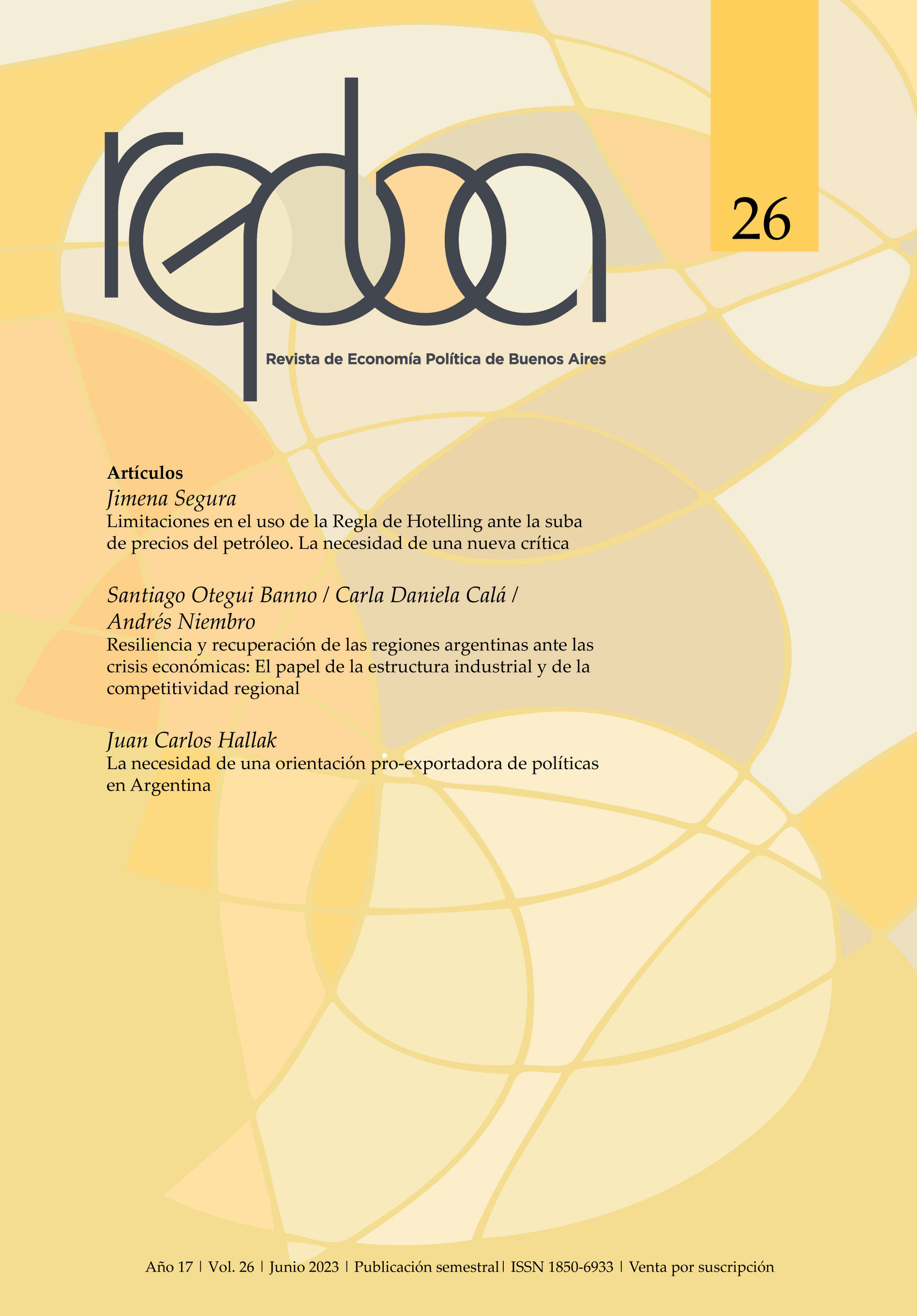Limitaciones en el uso de la Regla de Hotelling ante la suba de precios del petróleo. La necesidad de una nueva crítica
Resumen
En el artículo se presenta una mirada crítica a la teoría económica convencional de los recursos no renovables, mostrando que el concepto de renta por escasez que surge de la misma refleja serias limitaciones explicativas en cuanto a la relación entre precios e inversión en la industria del petróleo. Se analiza la literatura teórica y empírica mediante la exposición de las revisiones modernas de la teoría del agotamiento, y la contraposición del contenido del concepto de renta por escasez expuesto por Lewis Gray -precursor de Hotelling- frente a la teoría clásica de la renta de David Ricardo.
Descargas
Citas
· Adelman M.A. (1986). "Scarcity and World Oil Prices". The Review of Economics and Statistics, Vol. 68 (Nro. 3) , pp. 387-397. USA: The MIT Press.
· Adelman M.A. (2004), "The real oil problem". Rev. Regulation Vol. 27 (Nro. 1) , pp. 16-21. USA: The MIT Press.
· Alhajji A.F., Huettner David (2000). "OPEC and other commodity cartels: a comparison". Energy Policy Nº28, p. 1151-1164.
· Arrow K., Chang S. (1978). "Optimal pricing, use and exploration of uncertain natural resource stock". Technical Report Nro. 31. USA: Department of Economics, Harvard University.
· Barnett, Harold J., Morse Chandler. (1963). "Scarcity and Growth: The Economy of Natural Resource Availability". Johns Hopkins University Press for Resources for the Future, Baltimore, USA.
· Birol F. (2005), "World Energy Prospects and Challenges". International Energy Agency. París, Francia. Recuperado de https://www.iea.org/publications/freepublications/publication/birol.pdf.
· British Petroleum (2007). Statistical Review of World Energy June 2007.
· Campbell C. J. (Marzo 2000). "Myth of Spare Capacity Setting the Stage for Another Oil Shock". Oil and Gas Journal, Vol. 98 (Nro. 12), p.p. 20-21. USA.
· Campbell C. J. (Noviembre 2002). "Petroleum and People". Population and Environment, Vol. 24, No. 2. Londres, RU: Oil Depletion Analysis Centre.
· Commodity Futures Trading Commission, (Julio 2008). "Interim Report on crude oil". Interagency Task Force.
· Dale S., Fattouh B. (Enero 2018). "Peak oil demand and long-run prices". British Petroleum. Recuperado de https://www.bp.com/en/global/corporate/energy-economics/spencer-dale-group-chief-economist/peak-oil-demand-and-long-run-oil-prices.html
· Dasgupta P., Heal G. (1974). "The Optimal Depletion of Exhaustible Resource”, The Review of Economic Studies, Volume 41, Issue 5, Pages 3–28.
· Devarajan S., Fisher A. C. (1981). "Hotelling's Economics of Exhaustible Resources: Fifty Years Later". Journal of Economic Literature, Vol. 19 (Nro. 1), pp. 65-73. USA: American Economic Association.
· Devarajan S., Fisher A. C. (1982). "Exploration and Scarcity". The Journal of Political Economy, Vol. 90 (Nro. 6), pp. 1279-1290. USA: The University of Chicago Press.
· Energy Information Administration US Department of Energy (Junio 2008). "Short-Term Energy Outlook". Recuperado de https://www.eia.gov/outlooks/steo/
· Energy Information Administration US Department of Energy (2010), "What Drives Crude Oil Prices?". Recuperado de https://www.eia.gov/finance/markets/crudeoil/
· Gray L.C. (1914). "Rent Under the Assumption of Exhaustibility". The Quarterly Journal of Economics Vol. 28 (Nro. 3), pp. 466-489. RU: Oxford University Press.
· Griffin J. M. (1985). "OPEC Behavior: A Test of Alternative”, The American Economic Review, Vol. 75 (Nro. 5), pp. 954-963. USA: American Economic Association.
· Hamilton J. (2008). "Understanding Crude oil prices". USA: Department of Economics, University of California.
· Heal G, Barrow M. (1980). "The relationship between interest rates and metal-price movements". Review of Economic Studies, Nro. 47.
· Hotelling H. (1931). "The Economics of Exhaustible Resources". The Journal of Political Economy, Vol. 39 (Nro. 2), p.p. 137-175. USA: University of Chicago Press. Traducción: Alvarez; Diaz Serna y Olaya. Recuperado de www.eumed.net/cursecon/textos/.
· Hubbert K. (1956). "Nuclear Energy and the Fossil Fuels". Drilling and Production Practice, Nro. 95. Houston, USA: American Petroleum Institute.
· Hubbert K. (1982). "Oil and gas supply modeling". NBS special publication, Nro. 631. USA: U.S. Department of Commerce/National Bureau of Standards.
· Hvozdyk L., Mercer-Blackman V. (2010), "What Determines Investment in the Oil Sector? A New Era for National and International Oil Companies", USA: Cambridge University and Inter-American Development Bank.
· International Monetary Fund (Octubre 2008). "World Economic Outlook". USA: World Economic and Financial Surveys.
· International Energy Agency (2005). "Monthly Oil Market Report". París, Francia: IEA. Recuperado de www.iea.org.
· Jevons S. (1866). The Coal Question; An Inquiry concerning the Progress of the Nation, and the Probable Exhaustion of our Coal-mines. London, Macmillan and Co., 2nd edition, revised. Recuperado de The Online Library of Liberty.
· Krautkraemer J. (1998). "Nonrenewable Resource Scarcity". Journal of Economic Literature, Vol. 36 (Nro. 4), pp. 2065-2107. USA: American Economic Association.
· Lane J. (1973). "The Impact of Oil Price Increases on the Market for Nuclear Power in Developing Countries". IAEA.
· Livernois J. R., Uhler R. S. (Febrero 1987). "Extraction Costs and the Economics of Nonrenewable Resources". Journal of Political Economy, Vol. 95 (Nro. 1) pp. 195-203, USA: The University of Chicago Press.
· Miller M., Upton C. (1985). "A Test of the Hotelling Valuation Principle". Journal of Political Economy, Vol. 93 (Nro. 1), pp. 1-25. Chicago, USA: The University of Chicago Press.
· Nordhaus W.D., Houthakker H., Solow R. (1973). "The Allocation of Energy Resources". Brookings Papers on Economic Activity Vol. 1973 (Nro. 3), pp. 529-576. USA: The Brookings Institution.
· Organization of the Petroleum Exporting Countries (2008). "World Oil Outlook". Recuperado de www.opec.org
· Organization of the Petroleum Exporting Countries (2009). "OPEC Solemn Declarations". Viena, Austria. Recuperado de https://www.opec.org/opec_web/static_files_project/media/downloads/publications/Solemn_Declaration_I-III.pdf
· Pindyck R. (1978). "Optimal exploration and production of nonrenewable resources". USA: Massachusetts Institute of Technology.
· Pindyck R. (Diciembre 1980). "Uncertainty and Exhaustible Resource Markets". The Journal of Political Economy, Vol. 88 (Nro. 6), pp. 1203-1225. USA: The University of Chicago Press.
· Pindyck R. (1998). "The long-run evolution of energy price". USA: Massachusetts Institute of Technology.
· Ricardo, D. (Ed. 1985) (1816). Principios de economía Política y Tributación. México: Fondo de Cultura Económica.
· Simon J. (1990). "Hotelling´s Law: is it useful or wasteful?" Recuperado de http://www.juliansimon.com/
· Slade M. (1980). "Trends in Natural-Resource Commodity Prices: An Analysis of the Time Domain". Journal of Environmental Economics and Management Nro. 9, p. 122- 137.
· Slade M., Thille H. (2009). "Whither Hotelling: Tests of the Theory of Exhaustible Resources". Annual Review of Resource Economics, Vol.1, p.p.:1-694. USA.
· Smith K. V. (1978). "Measuring Natural Resource Scarcity: Theory and Practice". Journal of Environmental Economics and Management, Vol. 5 (Nro. 2). p.p. 150-171. USA.
· Solow R. (abril-junio 1975). "La economía de los recursos o los recursos de la economía". El trimestre económico, Vol. XLII (Nro. 166).
· Urquidi, V., Troeller R. (1976). "El petróleo, la OPEP y la perspectiva internacional". XXX Congreso de Ciencias Humanas en Asia y Africa del norte. Informe del Seminario sobre consecuencias y alternativas de la nueva situación energética. México: Fondo de Cultura Económica.
· World Energy Council (2007). "Survey of energy resources". Londres, RU. Recuperado de https://www.worldenergy.org/publications
· Yergin, D. (1992). Historia del Petróleo. Buenos Aires, Argentina: Ed. Vergara.
La aceptación de un original por parte de la revista implica la cesión no exclusiva de los derechos patrimoniales de los autores en favor de la Revista de Economía Política de Buenos Aires, quien permite la reutilización del contenido bajo una licencia Creative Commons:
Atribución-NoComercial-SinDerivadas
CC BY-NC-ND
De esta manera, el material se puede compartir y adaptar, siempre que se cite la autoría y la fuente original de su publicación (revista y URL de la obra), no se use para fines comerciales y se mantengan los mismos términos de la licencia.












